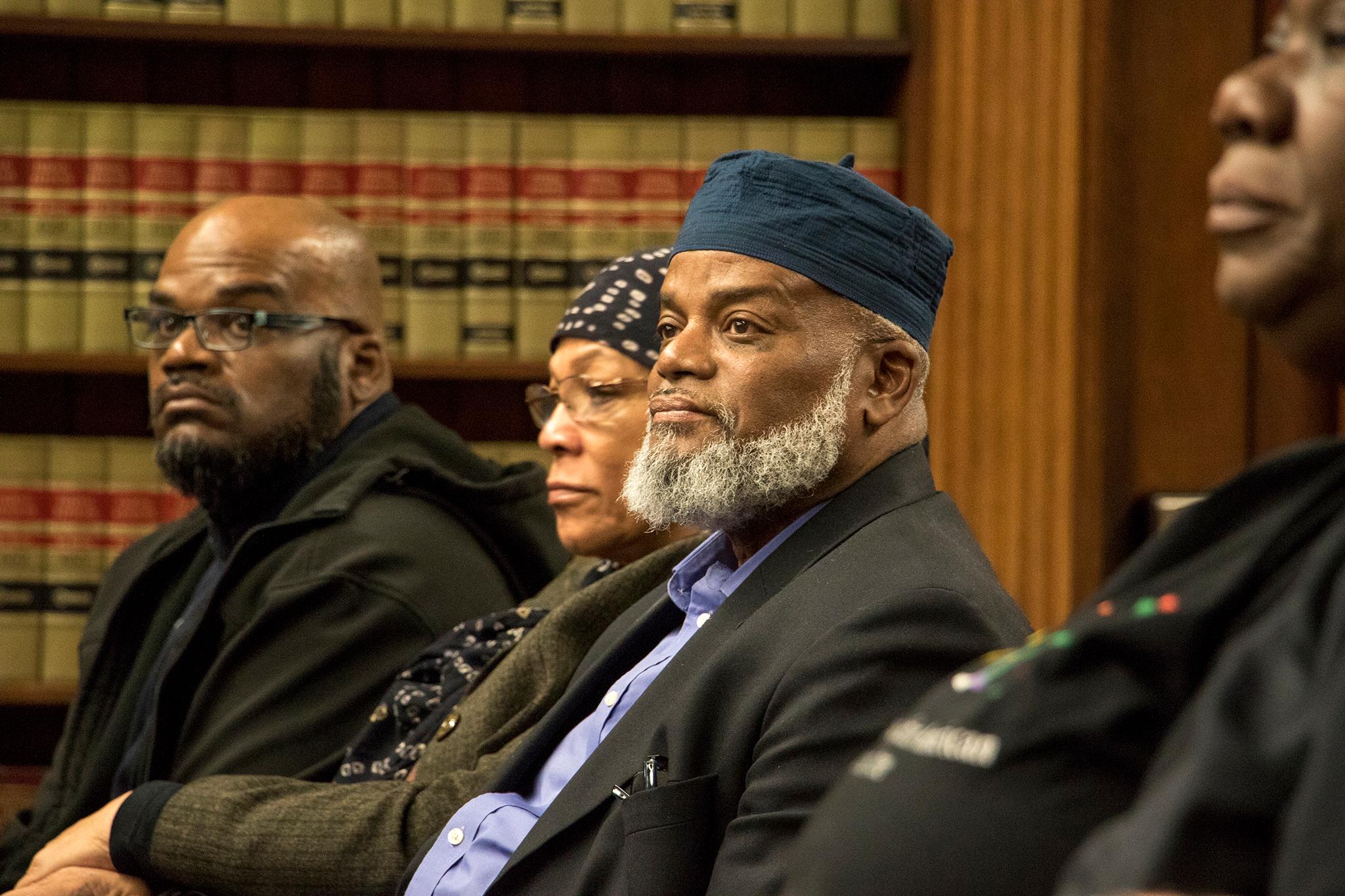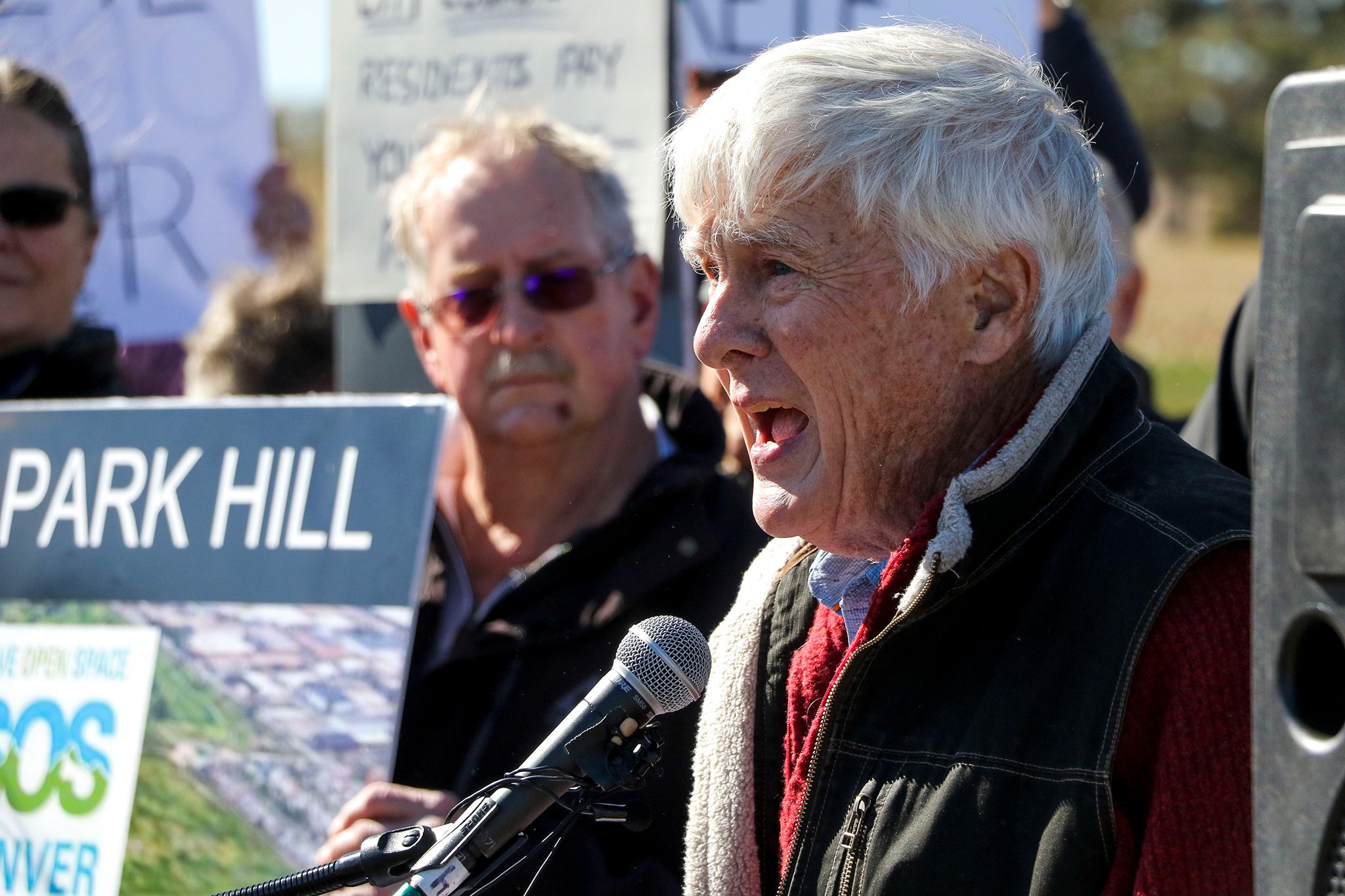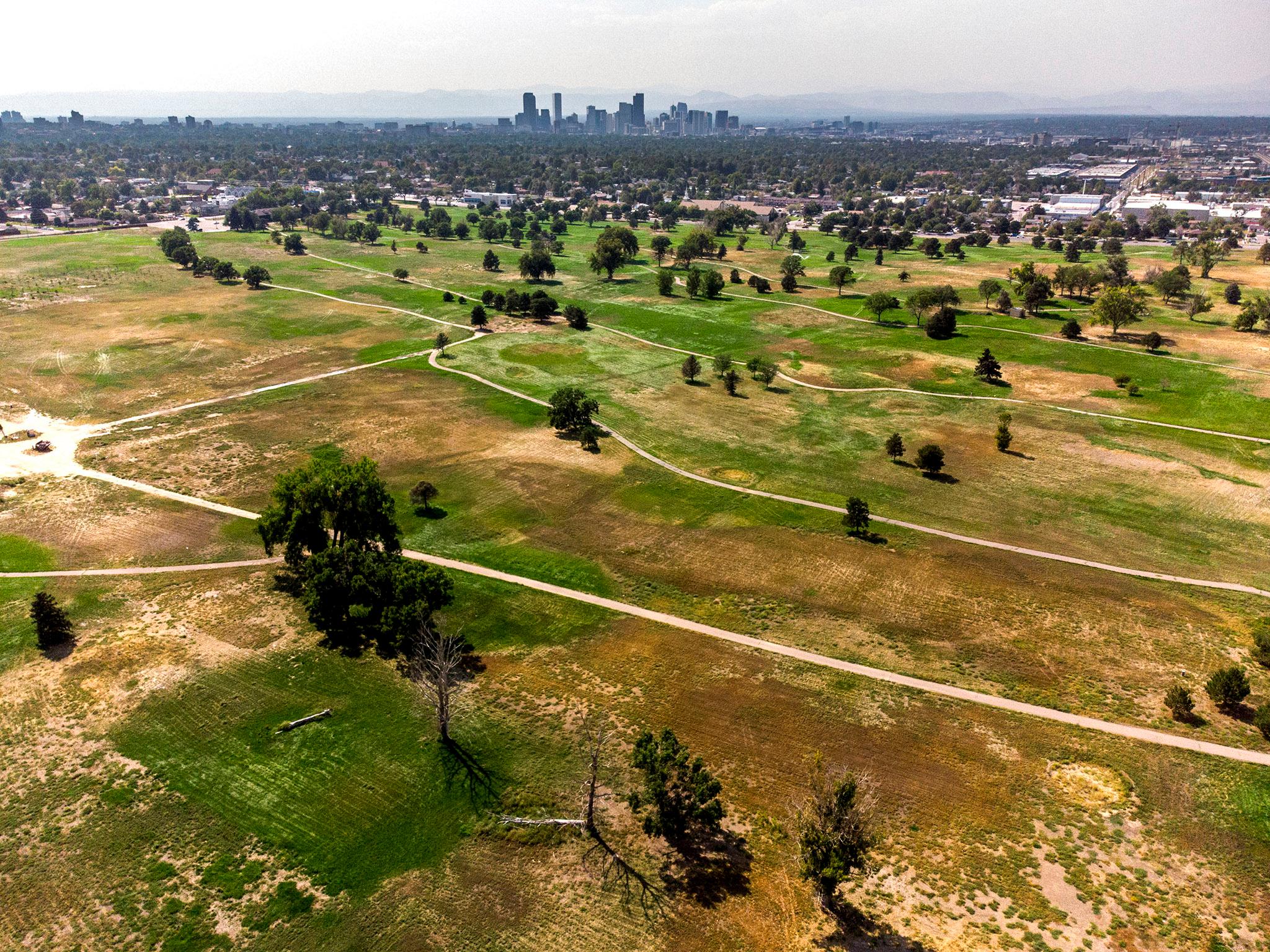The debate over the future of 155 acres of Northeast Park Hill, the defunct Park Hill Golf Course, has turned nasty.
People are accusing clergy of corruption and taking bribes. Others are stealing campaign signs. Accusations of deceit, ignorance, Not-in-My-Backyard NIMBYism, racism and, in turn, anti-nature and anti-housing zealotry are being slung.
The squabble may be over just 0.15594338471% of Denver, but people are fighting over the future like the city's soul is at stake.
In early March, Rev. Terri Hobart stood outside St. Thomas Episcopal Church as an opponent of the development cursed at her for five breathless minutes.
The protester's message: Hobart and the church shouldn't support a ballot measure allowing development at a 155-acre, privately owned defunct golf course in Northeast Park Hill.
As opponents of the development see it, this is a fight between "green and concrete," between a greedy developer and a neighborhood's ability to breathe, between a Denver committed to parks and open space and a city hell-bent on selling off every last inch for real estate.
Hobart, who moved to Denver in 2020, said she supports the former Park Hill Golf Course development because of her commitment to social justice. Denver's experiencing a housing crisis, and the development will include 25% affordable housing.
A group of nearby residents, including Hobart, negotiated a legally binding Community Benefits Agreement. In the process, the developers, Westside Investment Partners and the Holleran Group, have made multiple concessions to the neighborhood, including beefing up the amount of promised income-restricted housing and paying millions to create a park.
The project will bring attainable market-rate and affordable housing to the neighborhood, retail, funding for Black and brown women-owned businesses, pollinator gardens, an expansion of the tree canopy and space for a possible grocery store, along with more than 100 acres of parks.

"It's a really good deal for the people in Northeast Park Hill," Hobart said. "We don't have to choose between climate and housing, right? Housing policy is climate policy."
For taking that position, Hobart has spent the past few weeks scrolling through strongly worded messages in her inbox from opponents of the development.
She's been accused of "drinking the Kool-Aid," corruption and taking $50,000 from the developer, Westside Investment Partners -- which she said neither she nor the church have done.

"That's the tactic that has been used for generations," Hobart said. "You dismiss and diminish the voice of the marginalized. Like, whatever you say, 'Oh, if they're supporting it, they're in the pocket.' What they're saying is that the community leaders of Northeast Park Hill can't think for themselves, don't know what their community needs, and they're dumb enough to be manipulated by people."
Critics of the development spent an entire day calling Hobart's boss, the bishop who heads up the Diocese of Colorado, complaining about her stance.
When the church and bishop backed the priest, the bishop was blasted on social media.
St. Thomas Episcopal Church has put a safety plan in place, fearing opponents of the golf course development will disrupt services
Opponents of the land's development have said Hobart is a newcomer, unaware of the city's history. She's been accused online of selling out her church and trying to elevate her own profile by endorsing the project.
Hobart's response? She's listened to the community in Northeast Park Hill, and residents tell her they want retail, housing and a park, instead of a golf course. They've longed for a grocery store since both King Soopers and Safeway left the neighborhood. She's a believer in transit-oriented development. The creation of affordable housing will allow people priced out of Northeast Park Hill to return to a community that has become increasingly white.

St. Thomas Episcopal Church has a long history of social justice activism. The congregation has housed migrants, offers English as second language courses, and champions the Black Lives Matter movement.
Historically, St. Thomas Episcopal Church worked to fight segregation in Park Hill. Yet since those days, the church has done too little to support neighbors in nearby Northeast Park Hill, Hobart said, and this is the church's chance.
"We haven't stood by them through the gang violence," Hobart said. "We haven't dealt with the over-policing. To me, it felt like, specifically to St. Thomas, we had unfinished business. So I really got involved."
On the first Saturday in March, Park Hill residents filed into the Greater Park Hill Community Inc. headquarters.
There, in front of a portrait of Martin Luther King Jr., stood Denver's first Black mayor, Wellington Webb. He explained why he wants voters to oppose the redevelopment of the 155-acre former Park Hill Golf Course site to a crowd of largely white neighbors.
The standing-room crowd cheered the former mayor, as he took swipes at current Mayor Michael Hancock's administration and a string of mayoral candidates running in the 2023 election that Webb said are too business-friendly. Some he counts among his friends.

The candidates Webb opposed include former Denver Metro Chamber of Commerce head Kelly Brough, State Sen. Chris Hansen, former State Sen. Mike Johnston, City Councilmember Debbie Ortega, Tattered Cover CEO Kwame Spearman and self-funded Republican businessman Andy Rougeot.
At least three of those candidates, Johnston, Hansen and Ortega, have received donations from Westside's founder Andrew Klein. When asked by political commentator Eric Sondermann at a Channel12 debate if they had taken money from Westside or related entities, all three said no.
Denverite asked about the contributions from Klein that the candidates did not disclose at the debate. Ortega never responded. Johnston said he believed the question was about corporate entities, not individuals. Hansen said he didn't know who the head of Westside was.
"As we tell our kids, omission is just a different way of saying it's a lie," Webb said.
Webb has endorsed State Rep. and mayoral candidate Leslie Herod, who opposes lifting the conservation land easement.
"Conservation easements have significant value, which is why I voted to strengthen them in the State Legislature," Herod explained in a statement. "The Denver Post got it right when they said that ballot measure 2O is a bad deal for Denver. We have so little undeveloped land left in the city and Denver is ready to move past the era where developers dictate the future of our city. I'm committed to ensuring there is visionary community engagement and participation from day one as we shape our city's future."
Webb also listed some other people running for mayor that he considers "community candidates," or those that have opposed the golf course redevelopment to his satisfaction.
Those include: Ean Thomas Tafoya, Terrance Roberts, Trinidad Rodriguez, Aurelio Martinez, Lisa Calderón and Al Gardner.
Tafoya has testified to City Council about the issue. Calderón was a loud voice against the development. She even sat on the steering committee, until the Hancock administration, represented by Community Planning and Development head Laura Aldrete and Parks and Recreation head Happy Haynes, booted Calderón from the group.
Roberts spent years as an anti-violence activist in Northeast Park Hill, working as a community developer that helped bring the Anschutz Boys and Girls Club to the Holly, a shopping center in the neighborhood. While he's passionate about creating new housing, he's not as interested in private-sector solutions as he is in publicly funded and developed housing.
Webb described the attempt to develop the golf course as "racist."
"We have to call it for what it is," he said. "And it's especially horrible because your history in Park Hill has been wanting to fight for integration long before it was popular. And for many of the young ones to come along and say 'Vote Yes on 302,' -- this is just not, it's just not right."
Webb encouraged the opposition to get ready for a messy fight.

"You're gonna be outspent," Webb said. "You're going to be categorized as being not supportive to minority business. You're gonna be called..."
"Racist," multiple people shouted in the crowd.
"Racist," Webb responded. "You're gonna be called elitist from somebody who just got here."
The crowd laughed.
"NIMBY," someone shouted.
"NIMBY," he responded. "They're gonna call you all those names. I'd just say, 'I want parks and open space, and who's paying you.'"
The crowd applauded.
"We've got the best voices on our side," said an opponent of the development.
In early March, a video shared on social media showed a supporter of the development stealing a No on 2O yard sign. The opponents of the development cried foul.
"Pick up some yard signs, because you're gonna have to work twice as hard, because they're also stealing some of them," Webb said. "We call that guerrilla warfare. It's normally between 12 and 2 when they steal them."
He encouraged people to go to their contacts lists and start making calls.
He wanted to share the message: "Denver is not for sale. We can't allow developers to try to buy our votes and buy who we are. So we're going to have to work twice as hard, those of us that believe that land and open space and park space is important. Vote no on 2O. Send them back to the mayor's office. And let the next mayor and the next City Council come up with a new plan."
Imam Abdur-Rahim Ali, head of the Northeast Denver Islamic Center, arrived in Denver three decades ago. He recalled the Park Hill Golf Course wasn't welcoming to Black people.
"When I got here, that was basically a white space," he said.
For years, the golf course was segregated, as Denverite recently reported. That was challenged through the '60s.
But even after it wasn't officially a segregated space, the culture of the course never really changed, said Ali.
"They probably had a few -- a couple -- African Americans who would go over there and play golf, but few and far between."

Webb told the development's opponents that many Black leaders played at the golf course and that the notion that the Park Hill Golf Course was segregated was a myth.
Like Hobart, Ali has been accused of taking a $50,000 bribe to support the development.
"We've been attacked," he said. "That's for sure. You've got people just blurting out that we're getting some kind of payment."
Ali said if people are going to make such accusations they need to offer proof. "I know you ain't got any proof because I haven't taken any money."
He's considering sending a cease and desist letter to the opponents of the development accusing him of being bribed for his support.
"This is an affront to my character, and I consider myself a man of integrity," he said, adding, "I'm not going to let my name be dragged through the mud."
He's frustrated to hear the opponents of the development say they want the entire space to be a park and to frame the issue as "green vs. concrete," especially since Westside's development would include a massive park.
"The whole community is supposed to suffer and not have a dignified place to live with a supermarket and bank and businesses because the people we're talking about want open space? Come on," he said. "And you're still gonna have 100 acres of park space. It's the fourth-largest park in the city. So they've been disingenuous at best to talk about 'green versus concrete.'"
Ali said most of the people organizing against the development are not from Northeast Park Hill.
"They are in South Park Hill," he said. "They're in the affluent part of Park Hill. And they've been used to calling the shots in many cases, and we've looked at how the community has been just overrun. I'm not against gentrification, as long as it works for everybody."
As for the opponents, "It's mostly a group of lawyers, retired lawyers, and a few others who want to be able to call the shots," Ali said.
One of those retired attorneys is Woody Garnsey, an soft-spoken opponent of the development who has been at it since 2019. He has worked to preserve the city-owned conservation easement that limits how the land can be used.
While proponents of the development and Denver's City Attorney's Office argue the people of Denver have two choices -- development or golf course -- he said that's not true. The conservation easement could be amended, the golf course requirement could be struck and the land could be used as open space if the city purchased it and pushed for that.
While both the city and Westside say that's unlikely, Garnsey said it could happen under a new administration. Technically, he's right. But that isn't what Westside maintains it would do -- and Westside owns the land. Instead, the developer said it would open a golf course there.
Garnsey argued that turning the land into a park is the environmentally responsible thing -- especially in a neighborhood lacking adequate tree canopy.

"The idea of losing that in a time when we have all these climate problems throughout the city and throughout the state and across the country -- you know, you've got to hold on to this stuff," Garnsey said.
While Garnsey's passionate about the issue, he doesn't approve of rude behavior from either side.
"Like in most elections, people are going around ripping signs out of lawns," Garnsey said. When it comes to Hobart's stories of the No on 2O camp harassing people, Garnsey knows nothing.
"I can't admit or deny that that ever happened," Garnsey said. "I know nothing about it. It's unfortunate. We certainly don't condone anybody being nasty, verbally or otherwise, to anybody on the other side. And we are careful not to go around ripping out lawn signs of anybody on the other side.
"That doesn't mean that somebody hasn't done it who supports No on 2O," he said. "I don't have any knowledge about that. It certainly isn't something we're encouraging people to do."
On the second Saturday in March, development proponents rallied at the Park Hill Golf Course clubhouse to launch a door-knocking campaign in the neighborhood.
John Bailey, the chair of the Colorado Black Round Table and head of the Black Cannabis Equity Initiative, spoke to a crowd of largely Black Northeast Park Hill residents of all ages. They were there to support the development and canvas the neighborhood with Yes on 2O yard signs and information about the ballot measure.
Bailey, who is working as a paid organizer on the project, quoted Langston Hughes: "What happens to a dream deferred." He said he didn't want the future of the site to be deferred.

"What we're looking for is an opportunity to help folks in this community deal with affordable housing, jobs, athletic fields, and any number of positive things," Bailey said.
Norman Harris, one of the developers with the Holleran Group that is working on the project, described the outreach the developers have done with everybody from the local football team and churches to the project's opponents.
"We have listened," Harris said. "And we have developed an eloquent solution. We have a plan. When you ask the other folks what their plan is, it is to keep us stagnant. So this plan puts us first. It brings us the things that we need for these young folks in the neighborhood."
Kevin Marchman, a former head of the Denver Housing Authority, spoke about what makes the Park Hill Golf Course redevelopment unique is the community benefits agreement, which is legally binding and tied to the land.
"We've got to get this community out and fight for what is ours," Marchman said.

Milford Adams, with the Denver Metro Association of Realtors, said the golf course would allow people to own their homes.
"We've got to build generational wealth." he said.
Herman White, a coach with the Park Hill Pirates football team, said the community should give back to the next generation by allowing the development to happen.
"We're from this community," he said. "We have a vested interest in making sure our families can live in this community."

Northeast Park Hill resident and community leader LaMone Noles talked about the history of racism in real estate in Denver and also spoke to the importance of homeownership in preserving the Black community in Northeast Park Hill.
"My grandparents and my parents pooled their money and bought a nice house on Monaco," Noles said. "They also told me and my brother, 'You guys, reinvest in this neighborhood because it's a hot commodity. It's going to be in demand, and we need to stake our claim.' So what I'm asking you to do is help us stake our claim. Help us support the vision for this neighborhood and turn it back into a community."
On the second Sunday in March, parishioners leaving St. Thomas Episcopal Church were met with a protester.
Hobart said the person was there "to harass parishioners as they left."
The protester had No on 2O signs and flyers opposing the development. She criticized Hobart and the church's stance and heckled church goers as they left the building.
But St. Thomas had a plan, and the person was quickly escorted off the property.
"I reminded everyone to take photos first next time," Hobart said.
The church's policy, when facing criticism, is to respond once and leave it at that.
"We're not engaging because, why?" Hobart said. "It's not great. I mean, unless you follow the thing, 'all publicity is good publicity,' it's not great to have your church slandered."












